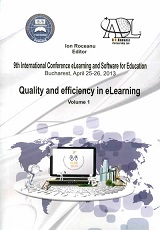LEARNING IN THE CONTEXT OF EDUCATIONAL INTEGRATION OF THE NEW TECHNOLOGIES. STUDY CASE – ROMANIA
LEARNING IN THE CONTEXT OF EDUCATIONAL INTEGRATION OF THE NEW TECHNOLOGIES. STUDY CASE – ROMANIA
Author(s): Helena Maria SaboSubject(s): Education
Published by: Carol I National Defence University Publishing House
Keywords: collaborative Learning; common interest; participation; social interaction
Summary/Abstract: This article presents the constructivist perspective and the collaborative Learning (CSCL) in the context of the theoretical foundations of implementation and use of new educational technologies. Computer-Supported Collaborative Learning (CSCL) is a newly emerging branch of science learning, concerned with the study how people can learn with the help of computers. It proposes to develop the programs and applications that bring students together and the creative activities, which can provide intellectual exploration and social interaction. The new technologies have made changes at all levels of society and it was expected to affect the education, forcing her to adapt to new needs and expectations. Students will have to learn to manage a huge number of information to analyze and make decisions, to develop their knowledge to face the challenges to the current reality. Using the new information and communication technologies in schools provides a unique dimension to the teaching - learning. The uses of ICT incite a paradigm shift in teaching and learning, visible in every part of the teaching process. This approach is more than learning a new method, we propose a complex strategy involving multitude of issues, including active participation of students in building their own learning, empowering them to use various applications that can help to solve topics that concern them, through a permanent and very important intellectual training, practice collaboration in student groups, with their orientation toward resolving issues of common interest.
Journal: Conference proceedings of »eLearning and Software for Education« (eLSE)
- Issue Year: 9/2013
- Issue No: 01
- Page Range: 585-590
- Page Count: 6
- Language: English

